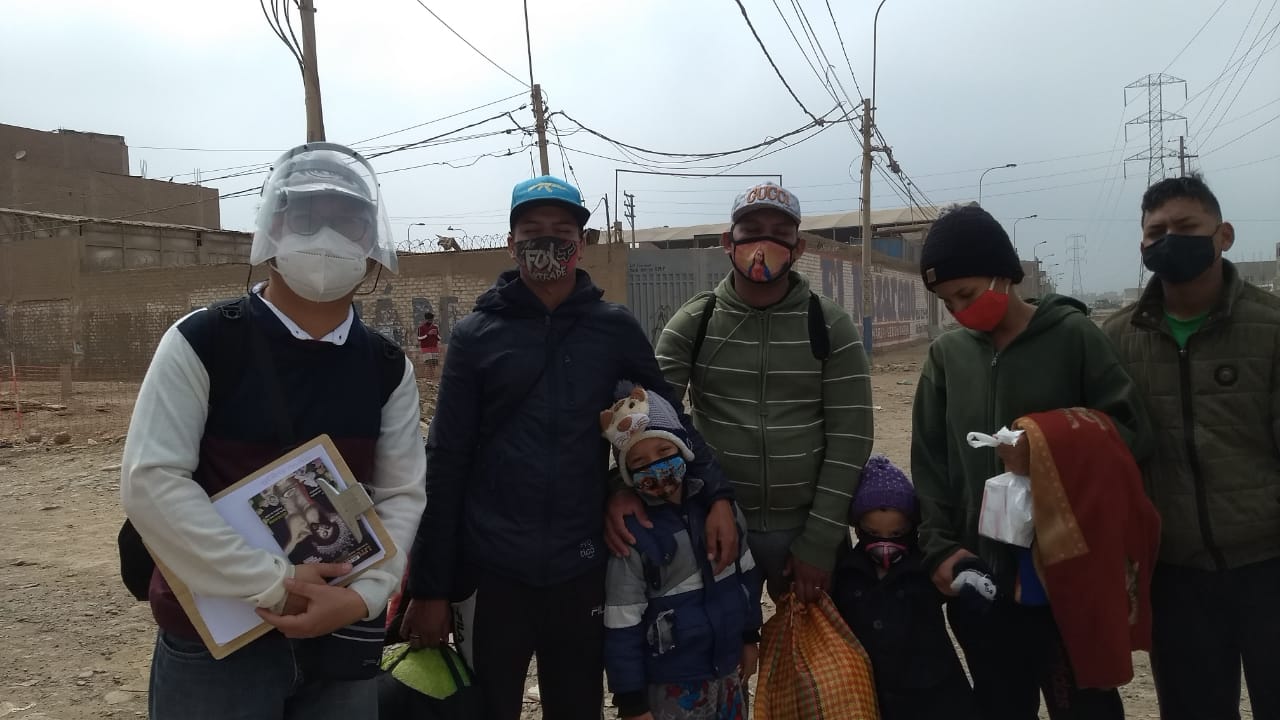Columban Fr Dylan Tabaco tells Fr John Boles how he thought he knew all about walking, until he came to Peru and met someone who’d walked across half a continent.
The Covid-19 pandemic may have brought hardship and tragedy to countless numbers throughout the world, but it also has had the effect of bringing out the best in many people. Additionally, it has connected remarkable individuals who otherwise might never have met.
That was the case for two young men from totally different backgrounds but with one thing in common: walking. One is Dylan Tabaco, a Columban priest from the Philippines. The other is Rafael Yovera, a Venezuelan refugee. Their unlikely point of contact was the city of Lima, Peru.
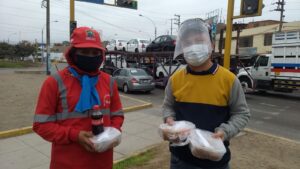 Dylan hails from the island of Mindanao in the far south of the Philippines. (His father was a fan of Western folk music, hence ‘Dylan’, after the famous Bob Dylan.) He grew up in a Columban parish, where generations of Columbans helped inspire his own vocation to missionary priesthood. (Chief among them was Fr Gerry Markey, now working in England, who gave the young Dylan a rosary and taught him the word, ‘missionary’. Dylan carries the rosary with him to this day.)
Dylan hails from the island of Mindanao in the far south of the Philippines. (His father was a fan of Western folk music, hence ‘Dylan’, after the famous Bob Dylan.) He grew up in a Columban parish, where generations of Columbans helped inspire his own vocation to missionary priesthood. (Chief among them was Fr Gerry Markey, now working in England, who gave the young Dylan a rosary and taught him the word, ‘missionary’. Dylan carries the rosary with him to this day.)
Whilst in our Philippine seminary he lived an event he describes as, “unforgetable”. His spiritual director, Irish Columban Fr Mick Mohally, decided to send the students off on a six-day hike, with no money in their pockets apart from their return bus fare.
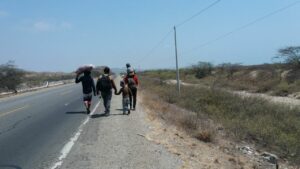 “It was a 160-kilometre walk. We had no food for the journey, and just relied on the providence of locals we met on the way. That experience helped deepen my vocation as a missionary. I felt the struggles of those who have less in life, not knowing if they can survive for another day with a starving stomach and no place to stay.”
“It was a 160-kilometre walk. We had no food for the journey, and just relied on the providence of locals we met on the way. That experience helped deepen my vocation as a missionary. I felt the struggles of those who have less in life, not knowing if they can survive for another day with a starving stomach and no place to stay.”
Memories of his epic trek were revived a dozen years later. By that time he had been ordained and appointed to the Columban parish of Santos Arcangeles in Lima. It was here he met Rafael.
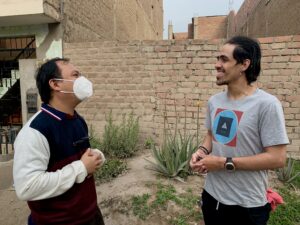 Rafael was born in Barquisimeto, Venezuela, in 1995. At that time, Venezuela was the richest country in South America. Today, it is the poorest. Ruined by years of mismanagement, corruption and authoritarian rule, the economy has collapsed, the rate of inflation is the world´s highest, unemployment has soared and the shops are empty. Rafael is one of over two million Venezuelans who decided they had to emigrate in order to survive and to support family members back home. (In Rafael’s case, an aged and infirm father.)
Rafael was born in Barquisimeto, Venezuela, in 1995. At that time, Venezuela was the richest country in South America. Today, it is the poorest. Ruined by years of mismanagement, corruption and authoritarian rule, the economy has collapsed, the rate of inflation is the world´s highest, unemployment has soared and the shops are empty. Rafael is one of over two million Venezuelans who decided they had to emigrate in order to survive and to support family members back home. (In Rafael’s case, an aged and infirm father.)
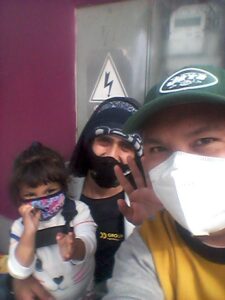 Half a million Venezuelan refugees turned up in Peru. Many settled in Lima, including Dylan’s parish. “A lot found jobs washing cars, selling things on the streets or doing other menial tasks,” Dylan recalls. Slowly they managed to improve their lives and send more and more money back home.
Half a million Venezuelan refugees turned up in Peru. Many settled in Lima, including Dylan’s parish. “A lot found jobs washing cars, selling things on the streets or doing other menial tasks,” Dylan recalls. Slowly they managed to improve their lives and send more and more money back home.
Then Covid struck.
“Soon, they were in an unimaginable situation. Hunger and homelessness became a daily realities for them.” The parish began organising an emergency relief programme to help cover some of the refugees’ basic needs.
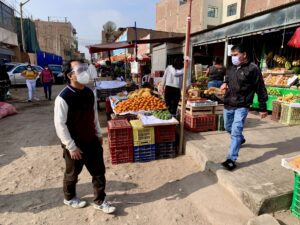 One day, as Dylan remembers, “On my way home after doing food distribution I met a young Venezuelan father with his baby girl, sitting outside a shop, trying to sell biscuits. He was cold and starving. I saw in his eyes how desperate he was to have something for his daughter.” This was Rafael.
One day, as Dylan remembers, “On my way home after doing food distribution I met a young Venezuelan father with his baby girl, sitting outside a shop, trying to sell biscuits. He was cold and starving. I saw in his eyes how desperate he was to have something for his daughter.” This was Rafael.
Dylan bought them a meal and they got talking. Rafael explained how he’d left home a couple of years before, but as soon as he’d crossed the border out of Venezuela he discovered the “travel agency” that he’d paid to get him to Lima had swindled him. They’d kept his money, all that he’d had for the journey. Broke, he’d walked most of the way through Colombia, Ecuador and the north of Peru, hitch-hiking when he could, sleeping rough and surviving by begging and selling the odd bag of sweets.
Finally arriving at his friend’s house in the Peruvian capital, things looked up. He got a job, met and married a local girl (Angela), had a child (little Alhai), rented a small home, started sending money back to his father…until the pandemic came along. Suddenly he was destitute again, but now with three mouths to feed, not just one.
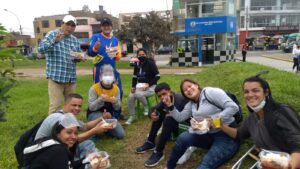 What really touched Dylan was that Rafael rounded off his tale with the words, “Life is difficult….but beautiful!”
What really touched Dylan was that Rafael rounded off his tale with the words, “Life is difficult….but beautiful!”
“Then,” Dylan recalls, “he smiled at me. It was such powerful statement coming from someone who’d gone through so much but never succumbed to hopelessness.”
Maybe this was the moment when Dylan remembered his walk and his poverty all those years before.
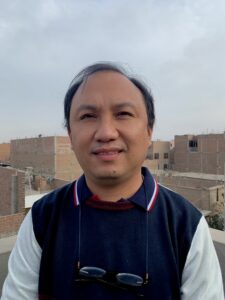 Recognising in Rafael a “fellow traveller” in more senses than one, Dylan used the parish network to get the family back on their feet again. By the time I met them, Rafael and Angela were working in a telesales office and had moved into a small flat.
Recognising in Rafael a “fellow traveller” in more senses than one, Dylan used the parish network to get the family back on their feet again. By the time I met them, Rafael and Angela were working in a telesales office and had moved into a small flat.
“If there is one good thing that happened to me during this pandemic,” Dylan told me, “it would be my encounter with our Venezuelen brethren. I remembered those stories in the Gospel where the marginalised of those times were so grateful when Jesus helped them.”
Rafael was more succinct in his summing up. “Dylan saved my life.”

